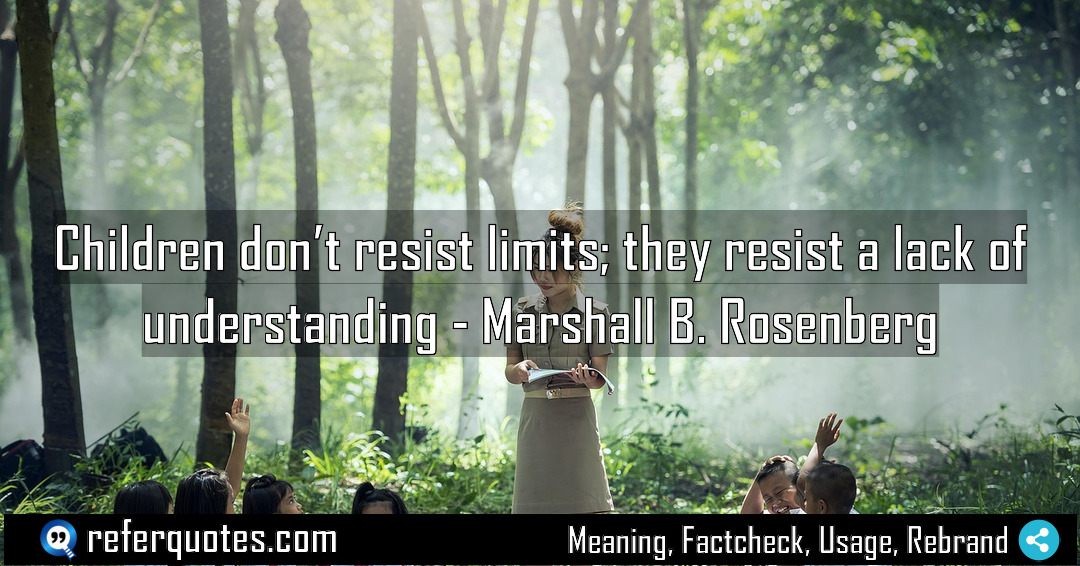
You know, that idea that “Children don’t resist limits; they resist a lack of understanding” is a game-changer. It completely reframes power struggles not as defiance, but as a breakdown in communication. Once you see it, you can’t unsee it.
Share Image Quote:
Table of Contents
Meaning
At its core, this quote tells us that kids aren’t fighting the rule itself; they’re fighting the confusion and powerlessness they feel when a rule is just dropped on them without reason.
Explanation
Let me break this down. For years, I thought a tantrum in the candy aisle was about the candy. It’s not. It’s about the sudden, jarring “NO” with no bridge of understanding. Kids have an incredibly sharp sense of justice. When we just lay down the law, it feels arbitrary to them. Unfair. But when you connect the limit to a need they can understand—”I know you love those gummies, and eating them now would spoil the amazing dinner you helped make”—you’re not just setting a boundary. You’re building a connection. You’re collaborating. The resistance just… melts away.
Quote Summary
Reading Level68
Aesthetic Score86
Origin & Factcheck
This wisdom comes straight from Marshall B. Rosenberg’s 2005 book, Raising Children Compassionately. It’s a cornerstone of his Nonviolent Communication (NVC) framework. You sometimes see similar sentiments floating around, but this specific, powerful phrasing is Rosenberg’s.
Attribution Summary
Where is this quotation located?
| Quotation | Children don’t resist limits; they resist a lack of understanding |
| Book Details | Publication Year/Date: 2004; ISBN/Unique Identifier: 9781892005140; Last edition: PuddleDancer Press, 1st Edition, 48 pages. |
| Where is it? | Chapter: Limits with Empathy, Approximate page from 2005 edition |
Context
Rosenberg placed this idea within his larger mission to replace coercive, punitive language with empathetic, needs-based communication. He wasn’t just talking about parenting; he was teaching a whole new language for human connection, starting with our smallest humans.
Usage Examples
So how do you actually use this? It’s a shift in your opening line.
- For Parents: Instead of “No more screen time!” try “I’m pausing the tablet because I’m worried that all that blue light will make it hard for your body to get the deep sleep it needs to grow so strong.” You’re linking the limit to their well-being.
- For Educators: Instead of “Stop running in the hall!” you might say, “Let’s use our walking feet in the hall so that everyone in the classes we’re passing can concentrate on their learning.” You’re giving the why.
- For Leaders & Managers: This applies to adults, too! Instead of a top-down decree, explain the strategic need. People don’t resist change; they resist being changed without understanding the reason.
To whom it appeals?
Share This Quote Image & Motivate
Motivation Score82
Popularity Score79
Shareability Score84
FAQ
Question: But what if I explain and they still resist?
Answer: Great question. The explanation isn’t a magic wand. It’s the first step. The resistance then is usually a signal that their own strong need isn’t being heard. Your job shifts from explaining your limit to empathetically listening to their frustration about it.
Question: Does this mean I have to negotiate every single limit?
Answer: Absolutely not. Some limits are non-negotiable for safety. The practice is in *how* you communicate them. “I can’t let you play near the street. Your safety is my most important job,” is still an explanation, just a very firm and clear one.
Question: Isn’t this just giving in to the child?
Answer: This is the biggest misconception. It’s the opposite. You’re holding the limit *more* effectively because you’re removing the fuel of the power struggle. You’re being firm *and* kind, not permissive.
Similar Quotes
You know, that idea that “Children do not resist guidance; they resist domination” is a game-changer. It reframes every power struggle into a communication problem. Once you get this, your…
You know, that idea that “Children don’t need more rules; they need more understanding” completely reframes discipline. It’s not about being permissive, but about connecting with the real need behind…
You know, that idea that “Our goal is not to make children obey…” completely reframes parenting. It’s not about control, it’s about connection and fostering genuine understanding. It shifts the…
You know, when Marshall Rosenberg said “Children are not problems to be solved,” he was really onto something. It’s a perspective shift that changes everything about parenting and teaching. Instead…
When we stop demanding, children start listening. It’s a simple shift in mindset that completely transforms the dynamic between parent and child. Table of Contents Meaning Explanation Origin & Factcheck…
